#shubho noboborsho = happy new year
Note
You're Bengali right? ( I saw in your previous pin post that you could speak "ben" - that's Bengali i suppose? ) So-
Shubho Noboborsho!
hain, ami bangla boli😁shubho noboborsho bondhu🥰 💖 🥳notun bochorer onek onek priti shubhechha o bhalobasha💗💗💗
2 notes
·
View notes
Text
you look good in red and white ; william saliba

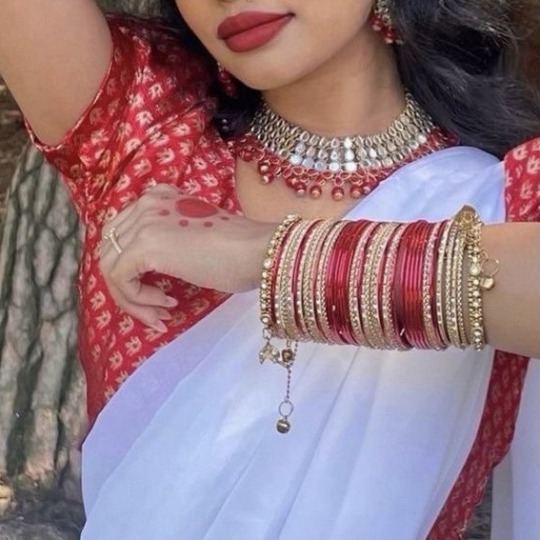

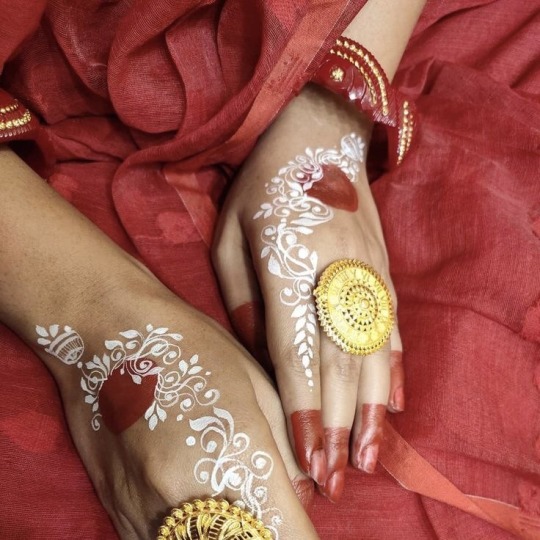

summary ♡ new year celebrations back home prove to be a handful but william tries his best to help you out.
pairing ♡ william saliba x bengali!fem!reader
content ♡ fluff, husband!william, reader is stresseddd and just needs a sit-down tbh, bengali words/terminology, reader is mentioned as having siblings, y/c/n = your cousin’s name, y/s/n = your sibling’s name, kissing, willo being the bestest husband ever !!!!
a/n ♡ arsenal football club are so bengali-coded pass it on 💯💯 ok so red & white are super traditional & prevalent in bengali culture + they’re ofc arsenal’s colours so i connected the dots 🤓☝🏽 (you didn’t connect shit ;-;) hehe anyway it was bengali new year this time last weekend & what better way to belatedly celebrate it than with a short and sweet wilo fic :D happy bengali new year / shubho noboborsho & i hope u all (bengali or otherwise!) enjoy this one !! ❤️🤍

“william! here, try this for us!”
no sooner than he had stepped a sandal-clad foot into the kitchen, you’re there shoving a chomchom into william’s mouth, the poor boy immediately being startled by your shouting and the manic running around of your siblings and cousins — not to mention the softly sweet intrusion his mouth experiences at the hands of his wife.
william had decided to escape the company of your dad and uncles once the mid-morning conversation turned to politics, knowing how chaotically passionate the men in your family get once the topic of current events gets brought up, in search of your comforting company in what’s the first time you’ve taken him back home in your relationship, never mind for such an important festivity. bengali new year in your motherland just hit differently and you wanted william to be fully immersed in every part of the extravagancies that your heritage brought to help pop his bengali culture cherry. unfortunately, being one of the “older younger” members of the extended family, you had taken it upon yourself to be at the forefront of all the festive tasks which meant that the new year wasn’t going to be quite the relaxed and enjoyable shared time either you or william had been thinking of.
although, admittedly, he shouldn’t have been so surprised at the utter carnage unfolding in the kitchen since every single one of your relatives was up at the slightest sliver of dawn today, rushing about the residence to begin the pressing yet procrastinated matter of setting up decorations, preparing the food and creating the most stunning of placards for the neighbourhood’s parade; all before one in the afternoon. the hubbub was so sweeping that william had missed a good morning kiss from you — having gotten up so early to denote roles to your younger relatives in the food preparation — and he hadn’t even seen you at the brief breakfast the family had managed to slip into the schedule, making him miss your presence way too much than was allowed in his terms. it was quite definitive of your relationship that you had essentially found him before he had seen you, rushing over in an outfit that william had never seen you in — a red and white shari wrapped around your body, gold jewellery adorning nearly every possible inch of you, the tinkle-tinkle of your anklets melodically ringing in his ears as you make your way over. it all takes his breath away regardless.
“how is it, huh?” you anxiously enquire, taking a quick bite of the sweet yourself, cheeks filling with the spongey sugary goodness as it muffles your voice. “we spent forever making the mix, first it was too soft then too hard, and then y/c/n accidentally dropped it on the floor then we had to argue about what the shape was gonna be and th–”
your stressed-out rambling causes william to laugh, taking the remainder of the chomchom from you and popping it into his mouth before telling you that it’s delicious and there is no reason to worry about it.
“i can give you a hand, y’know? i’m not that bad in front of dough.” he teases, offering to take some load off you and your appointed kitchen team for the day.
you’re quick to refuse, knowing there are quite literally hundreds of sweets and snacks needed to be made in a short amount of time to share throughout the neighbourhood and you don’t want his new year experience to be tainted with the interfamilial arguments that are sure to ensure within these here four walls over the next few hours.
“you should save yourself and rest before we set out for the parade, will, before we fully make you into our mishti guinea pig.” you usher him as best as you can towards the kitchen door and into the courtyard. “besides, i don’t want to be getting a strongly worded text from mikel for fattening you up too much for your job.”
another chuckle from your husband, who accepts, setting off to lend his hand in something else that isn’t getting in the middle of flour and sugar being haphazardly thrown around.
he finds himself in the company of some of your youngest cousins who assign him the role of batter in an impromptu game of cricket in the courtyard, taking the time to teach him all the techniques of a nationally beloved sport that he’s a complete novice in. after a couple of attempts of trying to understand the rules but giving up, his side nonetheless win the game and your baby cousin pipes up with the notion that william is now a “true bengali”, which makes your husband’s heart glow with affection for this new family of his.
the chattering and rushing of a group of yourself and some other cousins as you all pass through the courtyard pulls at his attention, intently watching as a number of you scramble around tables set up for the food and pace back and forth behind them and the kitchen, carrying what seems to be enough snacks to feed the whole country, never mind the neighbourhood. william can see the tension etched onto your face, brows nearly crossed over into a v-shape, and he so badly wants to step in and tell you to sit down for at least a minute but he knows the tasks at hand are more pressing and you really want to get this right for him, your family and the neighbours. he decides that he’ll have to remedy your stress once it’s actually appropriate to do so.
another hour or two follows before the lack of you gets to william, now missing your presence by his side so much that he’s pacing around the house like a madman, dipping into every room and asking whoever he stumbles into where your whereabouts may be. william was damn near about to start shouting your name from the rooftop before an aunt of yours points him towards the direction of the garden where you’re there by yourself, hastily brushing vivid paint over the sketched-out placards for the parade very, very last-minutely. you don’t even have to look up to know that it’s your lover who’s rushing towards you.
“god, it’s all going on today, isn’t it?” you speak before he can and try to place some humour in an otherwise extremely stressful situation, not even finding the time to take your eyes off the painting to look at william while explaining what’s going on. “y/s/n cut their finger and everyone else is so busy so i have to finish these and get them dried in…” you press your phone to check the time. “... 20 minutes.” yeah, you’re somewhat fucked right now.
“and who said you have to do it by yourself?” william rhetorically quizzes you; a mild scolding for bearing so much stress on yourself. “y/n, when’s the last time you sat down or even stopped your feet from running about the house? babe, i thought this was supposed to be a time when we both celebrated together, right? so why don’t we work together, too, yeah?”
you go to refuse him again and tell him to get ready for the parade with the rest of your family but william is having none of it.
“pass me a brush, please,” he softly demands with a sigh, hand outstretched as you eventually accept what he’s been saying to you since the morning and give him the tools he needs to help you finish the painting. you find yourselves completing it in more than half the time, leaving you plenty of time to fan them over to dry.
you turn to william, wanting to thank him for gently knocking some sense into you but getting instantly distracted when you finally allow yourself to take your husband in and appreciate him. you’re in awe of how extra handsome your husband looks in your culture’s traditional attire: a red and white panjabi set to match your shari, the golden handpainted motifs and embroidery sparkling against the rich colours of the cotton material.
“there, see, we finished it together! teamwork isn’t that bad, is it?” he teases and you respond with a tiny jab of your elbow on his side and a light laugh. “ah, hang on…”
he turns you to fully face him and points out that your red teep is slightly off-centre between your eyebrows, raising his hand to fix it while the other rests on the side of your face. your heartbeat picks up a little faster over his warm touch that you’d been missing for so many hours and the peek of his tongue out in concentration practically has hearts swirling in your eyes.
“there we go.” the way he smiles down at you tugs tenderly at your heartstrings and you can’t help but nearly smash your lips against his, the established habit of getting on your tiptoes to caress your alta-adorned hands along his broad shoulders helping to propel yourself into his embrace. william kisses back with all the might of a lover being starved of his wife’s touch for far too long.
a sudden call of your names quickly breaks the two of you apart, your aunt turning the corner towards you both with a camera waving in her hand and shouting something about taking a big family photo in front of the house before setting off. you and william are far too flustered to really comprehend what she’s saying before you’re wiping at your own mouths to rid yourselves of the red-stained evidence of your lipstick. your husband is about to take off behind your aunt to avoid any more time-wasting but you’re quick to grab his hand and pay him a greatly overdue compliment.
“oi, you look good in red and white.”

glossary of bengali terms ♡
chomchom = a milk-based bengali sweet.
shari = traditional clothing worn by bengali women; other languages may call it a "saree/sari".
mishti = bengali word for "sweet(s)".
panjabi = traditional clothing worn by bengali men.
teep = a small coloured dot/jewel worn between the eyebrows/on the forehead; you may see it being called a "bindi".
alta = red dye traditionally painted onto the hands and feet of bengali women during festivals and celebrations.

#william saliba#william saliba imagine#william saliba fluff#william saliba x reader#william saliba x fem!reader#footballer imagine#football imagine#football fic#footballer fluff#˗ˏˋ 📝 ˎˊ˗
45 notes
·
View notes
Note
I'm Bengali and this year I supported SRH instead of KKR lmao. I couldn't tell any of my friends🤣 except for one who doesn't really care that much about ipl (I mean I didn't either except for this year cause reasons!) and with whom I talked so so much about patty that let's just say she now pitties him cause of the myriad of characters I base upon him.
Also, in that video where patty is wearing that yellow kurta, the occasion is of Bengali New Year's. And he said, "Shubho Noboborsho" which means Happy New Year in Bengali. And I was just mesmerized, lmao. I was kind of bummed he wasn't in KKR anymore, but it's all for the good cause I loved watching him captain.
Then, Shreyas was feeding him "Roshogolla" which is a super famous Bengali sweet. And Patty was like, "Did you make this yourself?"
And I was like, "Oh, you sweet sweet naive Patty."
BUT, Shreyas said, "Yes," after hesitating for a moment. So, THEN, I was like, "Oh, you are baaaad."🤣
And Patty liked Roshogolla soooo much (Anyone will, it's that good) that when Shreyas was going away, he said, "Wait where are you going?!"
After that, I told that friend of mine, that if I meet him someday, I will take with me "ek haari roshogolla" meaning "one clay pot full of roshogolla" so that he may eat those all day long. And my friend was like, "Yeah, drown him in sugar syrup." 😅😭🤐
The discourse was so funny I thought it was worth sharing. And the recent ipl final photoshoot just made the Iyer-Cummins chemistry stronger for me.
oh the iyer-cummins chemistry is so strong it's crazy!! patty has such a sweet tooth honestly i don't think he'd even mind drowning in sugar syrup that much - i also think shreyas would learn to cook to impress him (though he wouldn't admit that's what he was doing)
2 notes
·
View notes
Text
HAPPY NEW YEAR EVERYONE
SHUBHO NOBOBORSHO :D
4 notes
·
View notes
Text
Happy Bengali New Year

Shubho Noboborsho!
May the new year bring you joy, peace, and prosperity.
0 notes
Note
HI SHUBHO NOBOBORSHO<333
Heyy Happy new year to you tooo!!!!!
1 note
·
View note
Photo

Pohela Boishakh
Wishing our all the Bengali well wishers Shubho Noboborsho! Pôhela Boishakh
Happy New Year!
.
May this year bring you prosperity, happiness, and success. ✨ Celebrate the occasion with our expertly crafted video and photography services that capture the essence of your traditions and culture. 📷🎥
.
#BengaliNewYear #ShubhoNoboborsho #PohelaBoishakh #Traditions #Culture #VideoProduction #Photography #Marketing #ContentCreation #Branding #Naishtika #NaishtikaAVs #NaishtikaAudioVisuals #Mumbai www.naishtika.com
0 notes
Photo

@tirth.o: happy Bengali new year 1427
stay home, stay safe
help the needy ones
20 notes
·
View notes
Text









শুভ নববর্ষ !
shubho noboborsho; happy bengali new year!
#bengali#desi#useraish#moodboard#bengali dark academia#sweets#trams#taxis#howrah bridge#art#lal par sada saree#books#dhunuchi#corridors#I'm very nostalgic#it hurts#I miss home#bengali aesthetic
347 notes
·
View notes
Text
POHELA BOISAKH OF BANGLADESH
Poila/Pohela Boishakh (Bengali: পহেলা বৈশাখ) is the first day of the Bengali calendar which is also the official calendar of Bangladesh. This festival is celebrated on 14 April in Bangladesh and 14/15 April in the Indian states of West Bengal, Tripura, Jharkhand and Assam (Barak Valley) by Bengalis regardless of religious faith.[2][3][4][5]
The festival is celebrated with processions, fairs and family time. The traditional greeting for Bengalis in the new year is শুভ নববর্ষ "Shubho Noboborsho" which is literally "Happy New Year". The festive Mangal Shobhajatra is organized in Bangladesh. In 2016, the UNESCO declared this festivity organized by the Faculty of Fine Arts, University of Dhaka as a cultural heritage of humanity.[6]
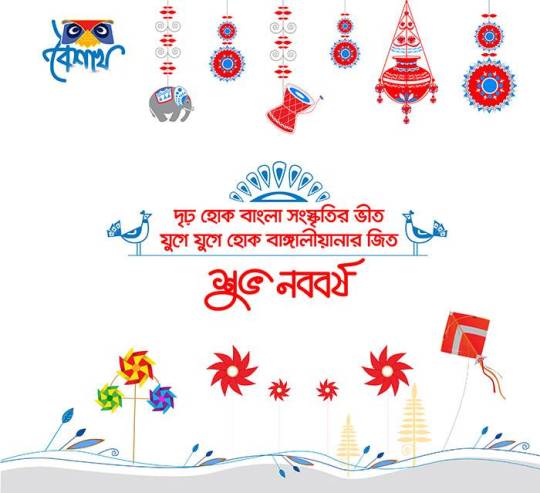
History and origin
Nomenclature
In Bengali, the word Poila or Pahela (Bengali: পহেলা) means 'first' and Boishakh (Bengali: বৈশাখ) is the first month of the Bengali calendar (Bengali: পহেলা বৈশাখ Pahela Boishakh).[7] Bengali New Year is referred to in Bengali as Nobo Borsho (Bengali: নববর্ষ), where 'Nobo' means new and 'Borsho' means year.[8] [9]
Mughal Emperor Akbar began the celebration of Bengali New Year and officialized the Bengali calendar to ease the tax collection process.
Traditional roots
Mughal references
During the Mughal rule, land taxes were collected from Bengali people according to the Islamic Hijri calendar. This calendar was a lunar calendar, and its new year did not coincide with the solar agricultural cycles. According to some sources, the festival was a tradition introduced in Bengal during the rule of Mughal Emperor Akbar to time the tax year to the harvest, and the Bangla year was therewith called Bangabda. Akbar asked the royal astronomer Fathullah Shirazi to create a new calendar by combining the lunar Islamic calendar and solar Hindu calendar already in use, and this was known as Fasholi shan (harvest calendar). According to some historians, this started the Bengali calendar. According to Shamsuzzaman Khan, it could be Nawab Murshid Quli Khan, a Mughal governor, who first used the tradition of Punyaho as "a day for ceremonial land tax collection", and used Akbar's fiscal policy to start the Bangla calendar.[10][11]
According to Shamsuzzaman Khan,[12] and Nitish Sengupta, the origin of the Bengali calendar is unclear.[13] According to Shamsuzzaman, it is called Bangla shon or shaal, which are Arabic (سن) and Persian (سال) words respectively, suggests that it was introduced by a Muslim king or sultan."[12] In contrast, according to Sengupta, its traditional name is Bangabda.[13][14] It is also unclear, whether it was adopted by Alauddin Husain Shah or Akbar. The tradition to use the Bengali calendar may have been started by Husain Shah before Akbar.[13] Regardless of who adopted the Bengali calendar and the new year, states Sengupta, it helped collect land taxes after the spring harvest based on traditional Bengali calendar, because the Islamic Hijri calendar created administrative difficulties in setting the collection date.[13]
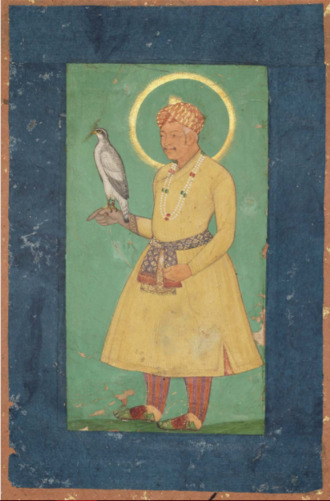
Vikramaditya references
Some historians attribute the Bengali calendar to the 7th century king Shashanka.[12][13] The term Bangabda (Bangla year) is found too in two Shiva temples many centuries older than Akbar era, suggesting that Bengali calendar existed before Akbar's time.[13] Various dynasties whose territories extended into Bengal, prior to the 13th-century, used the Vikrami calendar. Buddhist texts and inscriptions created in the Pala Empire era mention "Vikrama" and the months such as Ashvin, a system found in Sanskrit texts elsewhere in ancient and medieval Indian subcontinent.[8][15][16][17][18]
In rural Bengali communities of India, the Bengali calendar is credited to "Bikromaditto", like many other parts of India and Nepal. However, unlike these regions where it starts in 57 BCE, the Bengali calendar starts from 593 CE suggesting that the starting reference year was adjusted at some point.[19][20][21]
Contemporary Bengali calendar
In Bangladesh however, the old Bengali calendar was modified in 1966 by a committee headed by Muhammad Shahidullah, making the first five months 31 days long, rest 30 days each, with the month of Falgun adjusted to 31 days in every leap year.[22] This was officially adopted by Bangladesh in 1987. Since then, the national calendar starts with and the new year festival always falls on 14 April in Bangladesh.[22] In 2018-19, the calendar was amended again, with Falgun now lasting 29 days in regular years and to 30 days in leap ones, in an effort to more align with Western use of the Gregorian calendar. However, the date of the celebration, 14 April, was retained.
The Bengali calendar in India remains tied to the Hindu calendar system and is used to set the various Bengali Hindu festivals. For Bengalis of West Bengal and other Indian states, the festival falls either on 14 or 15 April every year. The current Bengali calendar in use in the Indian states is based on the Sanskrit text Surya Siddhanta. It retains the historic Sanskrit names of the months, with the first month as Baishakh.[22]

This section needs expansion. You can help by adding to it.
House cleaning and shopping
No matter how the other days are going . but it the first day of the bengali calendar which means in the pahela boishak bengalies keep their dress and house nit and tidy
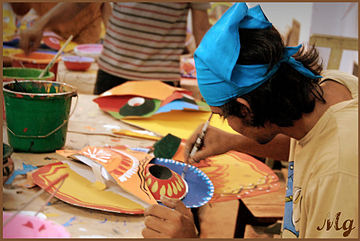
Visiting family and friends
During Pahela Baishakh people visit their families and friends and spend time together. Pahela Baishakh is also known for uniting friends and family.
Main article: Haal Khata
Haal Khata is a festival celebrated on the occasion of Pohela Baishakh in order to complete all the reckonings of last year and open a new ledger. It is observed by the Bengali businesspeople, shopkeepers and traders.
Red-White attire
On this occasion, men are seen wearing red or white Panjabi with traditional designs on them, imprinted or embroidered. Women and young ladies wear red and white saree with blouses and put on flower crowns on their heads. Girls also dress in salwar kameez. They are seen wearing traditional ornaments and accessories along with their dress.
Baishakhi meal
Usually, Bengali people eat Panta Bhat or poitabhat, which is a rice-based dish prepared by soaking rice, generally leftovers, in water overnight. It is popularly eaten with Hilsha Fish and other curries.[23]
Baishakhi rural fair
It is a fair held by the locals of that area where many different things ranging from books to special dishes are sold. Traditionally the fair was held under huge Banayan trees and traders from far across the areas would gather with their goods and toys in the fair. Some rides such as Nagordola (wooden Ferris wheel), are set for kids. Different types of traditional foods are sold out in the stalls such as Jilapi, Sandesh, Soan papdi, Batasha, Khoi (popped rice), Kadma (a candy made of sugar), and so forth. 'Bioscope', a form of the old movie projector, was also a part of the attraction for the youngsters back in days.[24]

Locality
Bangladesh
Mangal Shobhajatra at Pohela Boishakh in Bangladesh. UNESCO recognises Mangal Shobhajatra as cultural heritage.[25]
The Bengali New Year is observed as a public holiday in Bangladesh. It is celebrated across religious boundaries by its Muslim majority and Hindu minority.[26] According to Willem van Schendel and Henk Schulte Nordholt, the festival became a popular means of expressing cultural pride and heritage among the Bangladeshi as they resisted Pakistani rule in the 1950s and 1960s.[27]
The day is marked with singing, processions, and fairs. Traditionally, businesses start this day with a new ledger, clearing out the old which often involves inviting loyal customers and offering sweetmeats to them. This festival is called Haal Khata. Singers perform traditional songs welcoming the new year. People enjoy classical Jatra plays. People wear festive dress with women desking their hair with flowers. White-red color combinations are particularly popular.[28]
Bangladeshis prepare and enjoy a variety of traditional festive foods on Pohela Boishakh. These include panta bhat (lightly fermented watered rice), ilish bhaja (fried hilsa fish) and many special tarkari (vegetable curries).[29][28]
In Dhaka
Students of Charukala (Fine Arts) Institute, Dhaka University preparing masks for Pohela Boishakh.
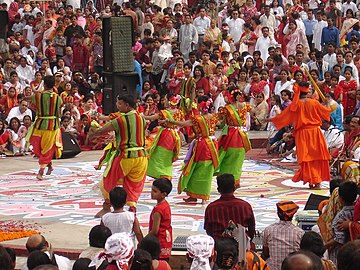
Colorful celebration of Pohela Boishakh in Dhaka
The celebrations start in Dhaka at dawn with a rendition of Rabindranath Tagore's song "Esho he Boishakh" by Chhayanaut under the banyan tree at Ramna (the Ramna Batamul). An integral part of the festivities is the Mangal Shobhajatra, a traditional colourful procession organised by the students of the Faculty of Fine Arts, University of Dhaka (Charukala). According to the history, the rudimentary step of Mangal Shobhjatra was started in Jessore by Charupith, a community organization, in 1985. Later in 1989 the Faculty of Fine Arts, University of Dhaka arranged this Mangal Shobhajatra with different motifs and themes. Now, the Mangal Shobhajatra is celebrated by different organization in all over the country.[30]
The Dhaka University Mangal Shobhajatra tradition started in 1989 when students used the procession to overcome their frustration with the military rule. They organized the festival to create masks and floats with at least three theme, one highlighting evil, another courage, and a third about peace.[6] It also highlighted the pride of Bangladeshi people for their folk heritage irrespective of religion, creed, caste, gender or age.[6]
In recent years, the procession has a different theme relevant to the country's culture and politics every year. Different cultural organizations and bands also perform on this occasion and fairs celebrating Bengali culture are organized throughout the country. Other traditional events held to celebrate Pohela Boishakh include bull racing in Munshiganj, Boli Khela (wrestling) in Chittagong, Nouka Baich (boat racing), cockfights, pigeon racing.[31]
In Chittagong
Pohela Boishakh celebrations in Chittagong involves similar traditions of that in Dhaka. The students of the fine arts institute of Chittagong University brings the Mangal Shobhajatra procession in the city, followed by daylong cultural activities.[32]
At DC hill & CRB, a range of cultural programmes are held by different socio-cultural and educational organisations of the city. The Shammilito Pohela Boishakh Udjapon Parishad holds a two-day function at the hill premises to observe the festival, starting with Rabindra Sangeet recitations in the morning. In the late afternoon, through evening, Chaitra Sangkranti programme is held to bid farewell to the previous year.[32]
At the Chittagong Shilpakala Academy, different folk cultures, music, dances, puppet shows are displayed.[32]
India
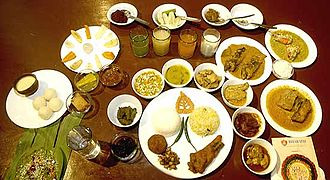
Pohela Baisakh festive meal
Bengali people of India have historically celebrated Poyla Boishakh, and it is an official regional holiday in its states of West Bengal and Tripura. The day is also called Nabo Barsho.[33]
West Bengal
Pohela Boishakh has been the traditional New Year festival in the state, with the new year referred to as the Noboborsho.[8] The festival falls on 14 or 15 April, as West Bengal follows its traditional Bengali calendar, which adjusts for solar cycle differently than the one used in Bangladesh where the festival falls on 14 April.[34]
Notable events of West Bengal include the early morning cultural processions called Prabhat Pheri. These processions see dance troupes and children dressed up with floats, displaying their performance arts to songs of Rabindranath Tagore.[35]
Tripura, Northeast India and Jharkhand
Pohela Boishakh is a state holiday in Tripura. People wear new clothes and start the day by praying at the temples for a prosperous year. The day marks the traditional accounting new year for merchants.[36][37] Festive foods such as confectionery and sweets are purchased and distributed as gifts to friends and family members.[37]
The festival is also observed by the Bengali communities in other eastern states such as Assam.[38]
In Jharkhand, this festival is celebrated with great amusement, especially in the cities of Ranchi, Hazaribag, Dhanbad, Jamshedpur, Jamtara, Bokaro and Dumka by the Bengali community and other locals.
Celebration in other countries
Bangladesh Heritage and Ethnic Society of Alberta in Canada celebrates its Heritage Festival (Bengali New Year) in a colorful manner along with other organizations. Bengali people in Calgary celebrate the day with traditional food, dress, and with Bengali culture.[39][40] The Bangabandhu Council of Australia also hosts a Pohela Boishakh event at the Sydney Olympic Park.[41]
12 notes
·
View notes
Text
Pohela Boishakh
Poila/Pohela Boishakh (Bengali: পহেলা বৈশাখ) is the first day of the Bengali calendar which is also the official calendar of Bangladesh.
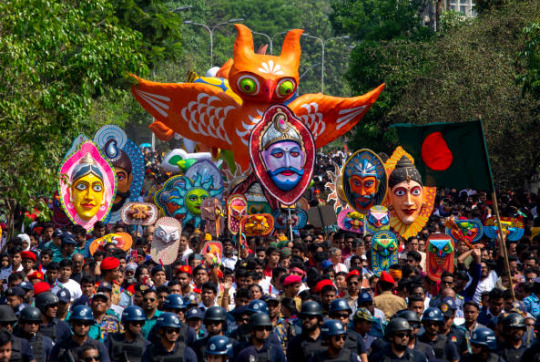
The festival is celebrated with processions, fairs and family time. The traditional greeting for Bengalis in the new year is শুভ নববর্ষ "Shubho Noboborsho" which is literally "Happy New Year". The festive Mangal Shobhajatra is organized in Bangladesh. In 2016, the UNESCO declared this festivity organized by the Faculty of Fine Arts, University of Dhaka as a cultural heritage of humanity.
History and origin:
During the Mughal rule, land taxes were collected from Bengali people according to the Islamic Hijri calendar. This calendar was a lunar calendar, and its new year did not coincide with the solar agricultural cycles. According to some sources, the festival was a tradition introduced in Bengal during the rule of Mughal Emperor Akbar to time the tax year to the harvest, and the Bangla year was therewith called Bangabda. Akbar asked the royal astronomer Fathullah Shirazi to create a new calendar by combining the lunar Islamic calendar and solar Hindu calendar already in use, and this was known as Fasholi shan (harvest calendar). According to some historians, this started the Bengali calendar. According to Shamsuzzaman Khan, it could be Nawab Murshid Quli Khan, a Mughal governor, who first used the tradition of Punyaho as "a day for ceremonial land tax collection", and used Akbar's fiscal policy to start the Bangla calendar.
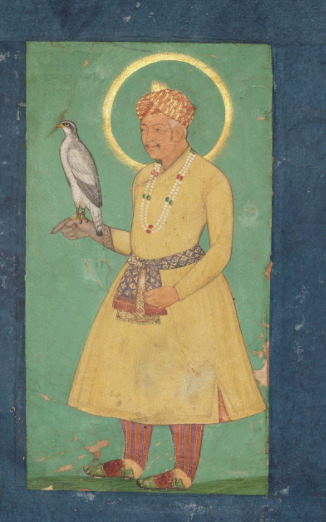
The Bengali New Year is observed as a public holiday in Bangladesh. It is celebrated across religious boundaries by its Muslim majority and Hindu minority.[26] According to Willem van Schendel and Henk Schulte Nordholt, the festival became a popular means of expressing cultural pride and heritage among the Bangladeshi as they resisted Pakistani rule in the 1950s and 1960s.[27]
The day is marked with singing, processions, and fairs. Traditionally, businesses start this day with a new ledger, clearing out the old which often involves inviting loyal customers and offering sweetmeats to them. This festival is called Haal Khata. Singers perform traditional songs welcoming the new year. People enjoy classical Jatra plays. People wear festive dress with women desking their hair with flowers. White-red color combinations are particularly popular.[28]
Bangladeshis prepare and enjoy a variety of traditional festive foods on Pohela Boishakh. These include panta bhat (lightly fermented watered rice), ilish bhaja (fried hilsa fish) and many special tarkari (vegetable curries).[29][28]
In Dhaka,
The celebrations start in Dhaka at dawn with a rendition of Rabindranath Tagore's song "Esho he Boishakh" by Chhayanaut under the banyan tree at Ramna (the Ramna Batamul). An integral part of the festivities is the Mangal Shobhajatra, a traditional colourful procession organised by the students of the Faculty of Fine Arts, University of Dhaka (Charukala). According to the history, the rudimentary step of Mangal Shobhjatra was started in Jessore by Charupith, a community organization, in 1985. Later in 1989 the Faculty of Fine Arts, University of Dhaka arranged this Mangal Shobhajatra with different motifs and themes. Now, the Mangal Shobhajatra is celebrated by different organization in all over the country.[30]

The Dhaka University Mangal Shobhajatra tradition started in 1989 when students used the procession to overcome their frustration with the military rule. They organized the festival to create masks and floats with at least three theme, one highlighting evil, another courage, and a third about peace.[6] It also highlighted the pride of Bangladeshi people for their folk heritage irrespective of religion, creed, caste, gender or age.[6]
In recent years, the procession has a different theme relevant to the country's culture and politics every year. Different cultural organizations and bands also perform on this occasion and fairs celebrating Bengali culture are organized throughout the country. Other traditional events held to celebrate Pohela Boishakh include bull racing in Munshiganj, Boli Khela (wrestling) in Chittagong
7 notes
·
View notes
Text

Day 2/40
Its Poila Baisakh (Bengali New Year) so I thought of starting the day with some Tagore. Finished more than half of the novel I started yesterday so I am quite happy about that. Will finish it today :) And binge on some Ray films to keep up with the tradition of the day.
Wishing everyone a Shubho Noboborsho (Happy New Year)
Reading : Stories from Tagore.
#study motivation#study series#studyblr#my stuff#productivity#productivity aesthetics#dark academia#indian dark academias#indian dark academia#satyajit ray#rabindranath tagore#studystudystudy#studyspiration
17 notes
·
View notes
Text


1950 hrs | 14th april, 2021 | day 97/100
shubho noboborsho! (happy new year)
now that my board exams are (hopefully) postponed, i can finally study ❤️
song of the day : gethalsame // jesus christ superstar
#studyblr#100 days of productivity#dark academia#studyinspo#history#dead poets society#ancient history#board exams#maps#india#ancient india#vedic afe#vedic astrology#shubho noboborsho#new year
15 notes
·
View notes
Photo




Am I even the same person? 😀😀😀
Anyway dolled up a bit for Bengali New Years for probably like 5 minutes and took selfies with my mom xD
Shubho Noboborsho (happy new year) to all!
#Trisha you inspired me XD#I didn't add too much glam it was a chill day#happy Bengali new year#shubho noboborsho#about me#too many peace signs just stahp XD
23 notes
·
View notes
Photo

Shubho Noboborsho Happy Bengali New Year I pray to mother nature to bless us with a healthier happier and a peaceful year ahead #BengaliNewYear #Bengali #happynewyear #HappyBaisakhi https://www.instagram.com/p/B-71JI9pt2F/?igshid=116kh34qsffsa
1 note
·
View note
Text
Heritage and History of Poila Boishakh

Poila/Pohela Boishakh is the first day of the Bengali calendar which is also the official calendar of Bangladesh. This festival is celebrated on 14 April in Bangladesh and 14/15 April in the Indian states of West Bengal, Tripura, Jharkhand and Assam (Barak Valley) by Bengalis regardless of religious faith.
Processions, fairs, and family time are all part of the festivities. "Shubho Noboborsho," which literally means "Happy New Year," is the customary Bengali greeting for the New Year. In Bangladesh, the Mangal Shobhajatra festival is held. This festival, produced by the Faculty of Fine Arts, University of Dhaka, was designated as a cultural treasure of mankind by UNESCO in 2016.
History and origin :
Nomenclature -
In Bengali, the word Poila or Pahela means 'first' and Boishakh is the first month of the Bengali calendar (Pahela Boishakh). Bengali New Year is referred to in Bengali as Nobo Borsho ,where 'Nobo' means new and 'Borsho' means year.
Traditional roots :
Mughal references -
Land taxes were collected from Bengali people according to the Islamic Hijri calendar during the Mughal era. This was a lunar calendar with a new year that did not correspond to the solar agricultural cycles. According to some reports, the event began in Bengal during the reign of Mughal Emperor Akbar as a way to align the tax year with the harvest, and the Bangla year was dubbed Bangabda as a result. Fasholi shan was the result of Akbar's request to the royal astronomer Fathullah Shirazi to design a new calendar by merging the lunar Islamic calendar and the solar Hindu calendar already in use (harvest calendar). This, according to some historians, was the beginning of the Bengali calendar.
According to Shamsuzzaman Khan, it could be Nawab Murshid Quli Khan, a Mughal governor, who first used the tradition of Punyaho as "a day for ceremonial land tax collection", and used Akbar's fiscal policy to start the Bangla calendar.
Vikramaditya references -
According to some historians, the Bengali calendar was created by king Shashanka in the 7th century. The phrase Bangabda (Bangla year) is also found in two Shiva temples that are hundreds of years older than Akbar's reign, implying that a Bengali calendar existed before Akbar's reign. The Vikrami calendar was used by various kings whose territory reached into Bengal before to the 13th century. "Vikrama" and the months such as Ashvin are mentioned in Buddhist scriptures and inscriptions from the Pala Empire era, a system seen in Sanskrit manuscripts throughout the ancient and mediaeval Indian subcontinent.
The Bengali calendar is credited to "Bikromaditto" in rural Bengali communities in India, as it is in many other parts of India and Nepal. In contrast to these regions, where the calendar begins in 57 BCE, the Bengali calendar begins in 593 CE, implying that the starting reference year was changed at some point.
Contemporary Bengali calendar -
However, in 1966, a commission led by Muhammad Shahidullah amended the traditional Bengali calendar, making the first five months 31 days long and the rest 30 days apiece, with the month of Falgun adjusted to 31 days in every leap year. Bangladesh formally accepted this in 1987. Since then, the national calendar has begun on 14 April, and the new year event has always occurred on that date. In 2018-19, the calendar was revised again, with Falgun now lasting 29 days in regular years and 30 days in leap years, in order to better match with the Gregorian calendar used in Western countries. The 14th of April, however, was kept as the date of the celebration.

Holiday customs:
House cleaning and shopping -
Visiting family and friends during Pahela Baishakh people visit their families and friends and spend time together. Pahela Baishakh is also known for uniting friends and family.
Haal Khata -
According to best astrologer in Kolkata, Haal Khata is a holiday observed on the occasion of Pohela Baishakh to close the previous year's ledger and begin a new one. Bengali merchants, shopkeepers, and traders are aware of it.
Red-White attire -
On this occasion, males are seen wearing red or white Panjabi with traditional designs on them, imprinted or embroidered. Women and young ladies wear red and white saree with blouses and put on flower crowns on their heads. Girls also dress in salwar kameez. They are seen wearing traditional ornaments and accessories along with their dress.
Baishakhi meal -
Bengalis typically consume Panta Bhat, also known as poitabhat, a rice-based dish made by soaking leftover rice in water overnight. It's often served alongside Hilsha Fish and other curries.
Locality :
Bangladesh -
Bangladesh observes the Bengali New Year as a national holiday. It is observed by both the Muslim majority and the Hindu minority, regardless of religion. The celebration, according to Willem van Schendel and Henk Schulte Nordholt, became a popular way for Bangladeshis to demonstrate cultural pride and heritage as they fought Pakistani domination in the 1950s and 1960s.
Singing, processions, and fairs are all part of the festivities. Businesses often begin this day by opening a new ledger and emptying out the old, which typically entails inviting loyal customers and providing them with sweetmeats. Haal Khata is the name of the celebration. Traditional tunes to ring in the new year are performed by singers. Classical Jatra plays are popular.
Dhaka -
The festivities begin early in the morning in Dhaka with Chhayanaut performing Rabindranath Tagore's song "Esho he Boishakh" under a banyan tree in Ramna (the Ramna Batamul). The Mangal Shobhajatra, a traditional colourful parade organised by students of the University of Dhaka's Faculty of Fine Arts, is an important feature of the festivities (Charukala).
According to the history, the rudimentary step of Mangal Shobhjatra was started in Jessore by Charupith, a community organization, in 1985.

In Chittagong -
According to famous astrologer in Kolkata, Pohela Boishakh celebrations in Chittagong are based on Dhaka's customs. The Mangal Shobhajatra procession is held throughout the city by students from Chittagong University's fine arts institute, and is followed by a day of cultural festivities.
West Bengal -
The traditional New Year festival in the state is Pohela Boishakh, with the New Year being referred to as the Noboborsho. The event takes place on 14 or 15 April, depending on whether West Bengal uses its traditional Bengali calendar, which adjusts for the solar cycle differently than Bangladesh's, which has the festival on 14 April.
Celebration in other countries -
Along with other groups, the Bangladesh Heritage and Ethnic Society of Alberta in Canada celebrate its Heritage Festival (Bengali New Year) in a spectacular manner. Bengalis in Calgary celebrate the day with traditional Bengali food, clothing, and culture. A Pohela Boishakh event is also held in the Sydney Olympic Park by the Bangabandhu Council of Australia.

#Famous astrologer in india#Famous Astrologer In Kolkata#Best Astrologers#Best astrologer in india#Best Astrologer in Kolkata#top astrologer in kolkata
0 notes